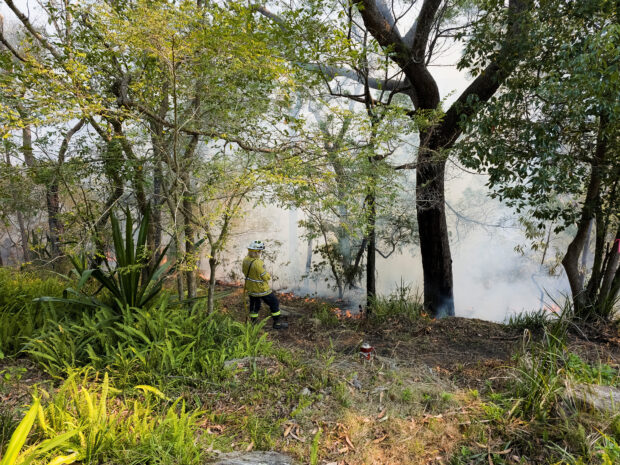Australia, scarred by bushfires, on high alert for dangerous summer

New South Wales Rural Fire Service firefighter Elisabeth Goh monitors a hazard reduction burn in Sydney, Australia, September 10, 2023. REUTERS FILE PHOTO
SYDNEY — Four years since bushfires destroyed wide swathes of southeastern Australia, killing 33, the country is once again on high alert, bracing for what weather experts say will be the hottest, driest period since the so-called Black Summer.
Just into the Australian spring, which starts in September, heat records are being broken in the densely populated area around Sydney, with some regional schools closed due to bushfire risk a month before the official bushfire season begins.
Adding to the tension, unusually heavy rain since the fires of 2019 and 2020 has spurred vegetation growth, producing more foliage to burn in an El Nino weather system, typified by hot, dry weather, which was declared on Tuesday.
“Once we’ve actually dried out the landscape from the wet conditions it’s starting from, it could be that we end up with a landscape that’s very dry but now has a lot of fuel because we’ve had such good vegetation growth,” said Jason Evans, a professor at the Climate Change Research Centre at the University of New South Wales.
“That would be perfect conditions for bushfires,” he said.
Article continues after this advertisementAustralians watched with grim recognition as wildfires ripped through Europe and North America in the 2023 Northern summer. Now there is a sense that it is the Australians’ turn again, with global warming speeding up and exaggerating changes in weather patterns, according to climate scientists.
Article continues after this advertisementOf Australia’s 10 hottest years on record, eight were since 2010, meteorologists say.
The short amount of time since the last catastrophic bushfire season has contributed to delays in hazard reduction burns, where firefighters pre-emptively burn off areas to limit the spread of bushfires, because some volunteer firefighters quit due to trauma, says the New South Wales Rural Fire Service.
The persistent heavy rain has also slowed the fire service’s ability to carry out controlled burns. With dozens of bushfires already burning, the volunteer service said it had done just 24% of the hazard reduction it had planned.
“We’ve just had rain after rain after rain event so we’re quite behind,” Rural Fire Service Commissioner Bob Rogers told Reuters.
The heavy rains also mean that, despite the return of dry heat, the starting conditions are different to the fires of 2019 and 2020, which followed a lengthy drought, said Rogers.
While rich in fuel, at least it is not tinder dry like it was in the Black Summer.
Still, “we’re taking it very seriously”, he added. “While it may not be as bad as that, you don’t need a fire season to be as bad as that for it to destroy homes and indeed take lives.”
RELATED STORIES